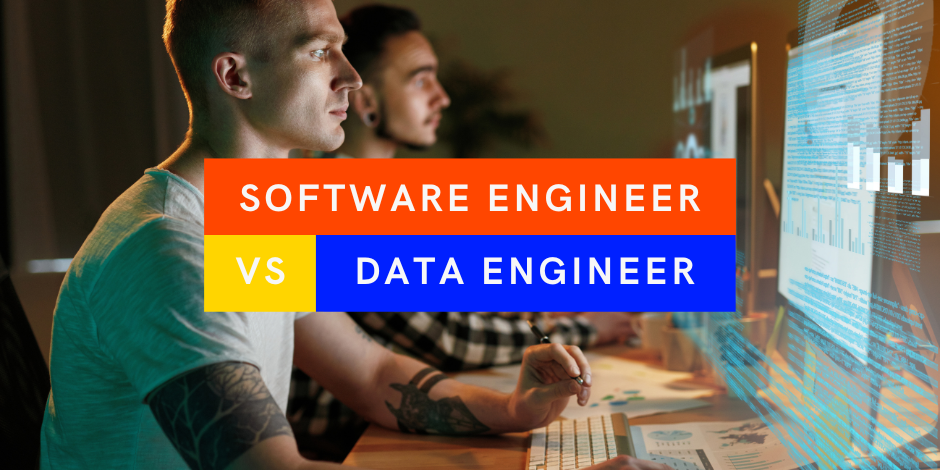Software Engineer vs Data Engineer: The Common Differences

Stay Informed With Our Weekly Newsletter
Receive crucial updates on the ever-evolving landscape of technology and innovation.
Software engineer vs data engineer. This article outlines the similarities and differences between these common professional roles in modern tech. The last few decades have witnessed a drastic rise in data creation, consumption, and transfer. This rise has led to increasing demand for experts who can build complex sites and applications and for professionals who can analyse, monitor and handle datasets.
These professionals are known as data engineers and software engineers. While they share several similarities in their roles, certain skills and responsibilities are best suited to only one of these two roles. The base similarity for both roles is their background in data management. However, data engineers are the ones who maintain large datasets that are key to business operations, while software engineering experts usually focus on fulfilling the needs of the end user.
This article will help you make a more informed decision as to which of these two pathways is the better career choice for you. We will focus on these two roles’ core similarities and differences, including their professional responsibilities, expected salary, prerequisite skill sets, and much more!
What is the difference between a software engineer vs data engineer?

The main difference between software engineers and data engineers is in their work style and the solutions they build and manage. While software engineers are more focused on developing apps, software, and other websites, most data engineering experts need to work on building diverse databases and data systems.
There is also the question of which other professionals these roles collaborate with. For example, while a software engineer mainly works with software developers, UI/UX designers, and other programmers to build the right software solutions, data engineering experts are more concerned with handling big data and other data science needs. In doing so, they must collaborate with business analysts, data scientists, and data analysts to visualise and modify sets for better data analysis and to present the correct data to the end users.
Understanding that both roles share similarities is crucial since they are still concerned with data and tech. However, there are also apparent differences between them, and it is essential to be clear on the key differences and similarities before choosing a career in any one field.
Let’s take a more detailed look into some of these fundamental differences, including core training, salary, professional responsibilities, required skills, and career scope in the future:
Primary certifications
It is vital to showcase some certification as proof of your skills and education before trying to be a professional engineer, whether it is in data or software. This can be any combination of high school diplomas, bachelor’s or associate degrees, and even online course certifications.
Most data engineering experts start their academic credentials with a college-level degree in a tech-related field like data science, CS, IT, or even information studies. Some students prefer to supplement these credentials with an online course targeted at specific database management skills, data warehousing, machine learning and big data.
As for software engineering experts, they traditionally start with an associate degree in fields like computer science, web development, or IT. Most students start their careers in entry-level positions and organically work their way up the ladder.
Since you will work with websites and web apps, getting a certification in full-stack development can also put you ahead of your peers and expose you to more career opportunities. You can do these in different colleges or go with an online bootcamp, where you can work with experienced instructors.
Before you start studying to get job ready, it is a good idea to explore which certifications are required for your dream role and then work your way backward. Online schools like the Institute of Data offer some excellent software engineering and data science courses that aim to prepare you as a professional with portfolio projects in just six months!
Required skills
Like the professional responsibilities of both roles that we will go over in the next section, there are several similar skills that data engineers and software engineers share. These include conflict resolution, problem-solving, and good communication. However, some tools and technical skills apart from these interpersonal qualities are specific to each role.
Professional software engineers need to have a good understanding of programming languages like Scala, Python, Java, and C++. In addition, they need to have excellent project management skills and the ability to work across different operating systems. Finally, after developing the assigned software, they need to test their designs and perform extensive debugging.
It is also essential for modern software engineering experts to understand the advances in cloud computing and to have a strong understanding of database architecture. To learn more about transitioning into software engineering as a career, read our guide detailing the 8 important steps!
As for data engineering experts, most of their skillset is focused on data science-related skills like understanding relational and non-relational databases, data warehouses, machine learning, and cloud computing. However, it is also necessary for professional data engineers to be comfortable with ETL systems, automation, scripting, and coding with languages like R, SRL, Python, Java, and Scala.
One of the most in-demand skills for modern data engineers is understanding back-end management and working with big data tools like Kafka, MongoDB, and Hadoop.
Professional responsibilities
Software and data engineers have contrasting job responsibilities, and for the most part, they need to collaborate with different teams within a firm.
Software engineers are focused on designing and developing the right software solutions to make business operations more efficient, mainly catering to end users’ needs. Even after they have designed and deployed these solutions, it is essential for them to monitor the apps and websites for any software issues and optimise them to have better speed.
They use their knowledge of programming languages to develop and validate software, troubleshoot software issues, and continuously monitor the performance of software systems. While they might have to consult with data engineers to build a plan around the company’s data systems, they rarely work with databases themselves.
As for data engineers, they are mainly concerned with developing and maintaining the organisation’s data infrastructure alongside data analysts. Doing so means acquiring the datasets per the business’s individual needs, developing the algorithms that can visualise this data to create workable insight, and maintaining their databases’ data pipelines and architectures.
Professionals will work on fulfilling the company’s financial and security objectives and fix any vulnerabilities after careful validation and analysis.
A software engineering career is ideal for a student who enjoys teamwork and developing good designs for efficient systems, web apps, and other software. On the other hand, data engineering is an ideal career for students who lean more toward problem-solving and building robust data systems.
Salary and compensation
Data engineers and software engineers earn considerably well as they are part of a growing industry. The exact salary will depend on your goals, experience, background, location, and the company you work for. In most cases, you can expect to get paid much better in metropolitan areas where the cost of living is also high.
It is also reasonable to expect a raise in your financial compensation with different job placements, modifying job descriptions and promotions. But overall, data engineers earn more than software engineers right now. While software development is a growing field, this decade is all about data, and you can expect to get paid over $100k a year as a data engineer on average. On the other hand, software engineers can expect to get just around $100k per year on average.
What are the career perks of being a software engineer?

There are several career perks of being a software engineer, as you will be part of a growing industry with a lot of demand for your skills and a high growth potential. You will also have a range of flexible opportunities with excellent pay. In addition, since most companies prefer to outsource their software engineering tasks, you can enjoy the freedom of taking a remote role while working with high-quality programs.
Since they need to work with high-end and macro-level tasks, new software engineers need to develop a problem-solving attitude quickly and efficiently. Furthermore, besides the technical aspect of building up software systems with code, you need to be team-oriented since you will be expected to collaborate with everyone from the project manager to the sales rep. If you want to learn about the difference between software engineers and software developers, take a look at this detailed guide!
As long as you are good at problem-solving, can communicate well, and are willing to upskill to stay competitive, you can enjoy a strong career with excellent job prospects well into the future.
What are the career perks of being a data engineer?

Being a part of a challenging albeit rewarding industry means there are several benefits to being a data engineer. As responsibilities include making accessing data sets easier for colleagues, data engineers often collaborate with data analysts, data scientists, and senior decision-makers to excel in their roles.
With the advancements in big data and the rise in online business, data engineers can enjoy excellent job opportunities with a lot of growth potential as long as they are efficient problem solvers who can create secure solutions that aid with data management.
While having a good grasp on database management is important, data engineers will also need experience working with programming tools like SQL and Python. This is because their duties will be centred around data modelling and data warehousing. In addition, it is always a good idea for data engineers to understand tools like Amazon Web services, as companies appreciate engineers who can work with a diverse range of tools.
Provided you keep the right approach to upskilling and have a knack for problem-solving, building data systems and good communication, you will enjoy excellent career opportunities as a data engineer.
Conclusion
To summarise our guide in one line, the main difference between a data engineer and a software engineer is that while one focuses on managing data infrastructures, the other builds web apps and software systems for a firm.
If you want more help picking out the best career choice, consider booking a career consultation with one of our experts.




